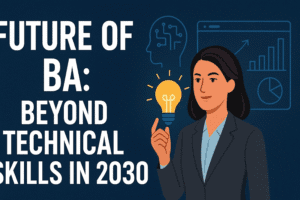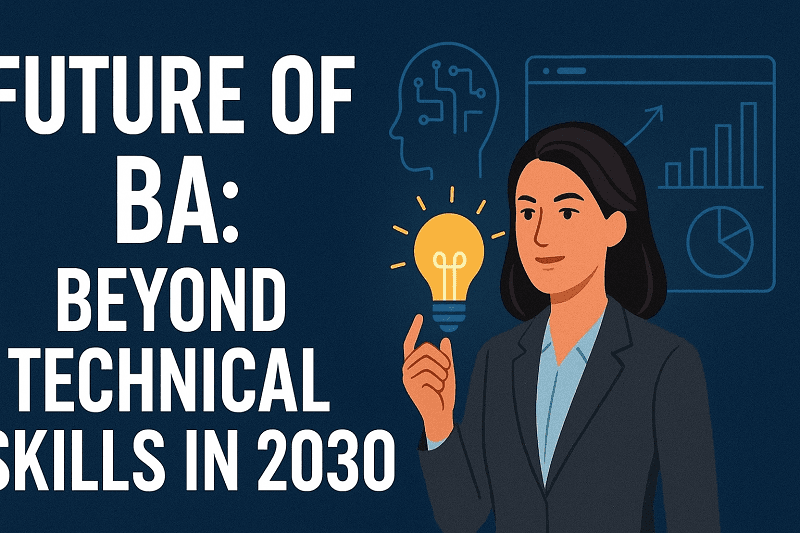
Intoduction
Are you a Business Analyst worried that AI might take your job by 2030? Let’s be honest—your technical skills alone might not be enough. The real question is, can you adapt? This article takes a closer look at the unexpected human qualities that will become the key to success for Business Analysts in the years to come, and how you can make sure your career not only survives but thrives.
Imagine it’s 2030
What if the most valuable traits for a Business Analyst aren’t what you think? Beyond coding, tools, and data models, the role is shifting toward qualities like empathy, strategy, and adaptability. Let‘s explore how the BA role is changing — and what you can do to stay ahead.
The Great Tech Shift: BA’s New Role
By 2030, automation and AI will have changed the way organizations work.
But contrary to what many believe, this doesn’t mean that Business Analysts will become irrelevant — it means their real value will finally be recognized.
Automation Takes Care of Repetitive Tasks
Routine work like gathering data, creating reports, and documenting processes is already being handled by AI tools such as ChatGPT, Power BI Copilot, and Jira automation.
Instead of being afraid of these technologies, BAs can use them to free up time and focus on strategic decision–making.
Example:
In a financial services firm, AI may automatically spot trends in transactions.
The BA’s role then switches from collecting that data to interpreting what it means — such as identifying customer behavior patterns or potential compliance risks.
AI Insights Improve Strategic Thinking
While AI can generate reports, BAs are still needed to turn those insights into real business value.
Understanding why a trend is important is something that remains uniquely human.
BAs Become Solution Architects
The Business Analyst in 2030 won’t just hand off requirements — they’ll help design the solutions.
They’ll act as a bridge between business goals and technical execution, collaborating with developers, product owners, and data scientists as solution architects.
Beyond the Code: Human-Centric Skills
As AI takes over the technical work, human skills will define a successful Business Analyst.
Empathy and Active Listening
Understanding user pain points goes beyond just asking questions.
BAs will need to truly listen — not just to what is said, but to what is meant.
Example:
When a healthcare BA interviews doctors about patient record systems, they might notice frustration with the time spent on data entry — uncovering a workflow problem rather than just a system bug.
Navigating Stakeholder Dynamics
By 2030, businesses will involve a wide range of teams — data scientists, AI engineers, UX designers, and business sponsors.
The BA’s role is to be the translator and diplomat who balances different priorities and brings the team together around a shared vision.
Persuasive Communication and Storytelling
Data alone can’t inspire change — stories can.
Future BAs will master the art of using data to create compelling narratives that drive decision–making at the highest level.
Strategic Visionaries: The BA as a Consultant
In 2030, Business Analysts will move from being task–oriented to being trusted advisors.
Identifying Opportunities, Not Just Problems
Instead of just reacting to issues, BAs will proactively spot trends and suggest new business models or digital solutions before stakeholders even ask.
Example:
A BA in the retail sector might analyze customer data and suggest using AI to offer personalized recommendations — directly increasing sales and customer loyalty.
Leveraging Data for Strategy
While data scientists provide analytics, the BA interprets them in terms of business goals — aligning insights with growth, efficiency, or customer experience.
Driving Innovation and Transformation
Business Analysts will become catalysts for change, helping organizations adopt technologies like AI, blockchain, and quantum computing.
The Agile Advantage: Adaptability is Key
Agile will continue to be the foundation of modern business analysis, but its meaning will evolve.
Thriving in Fast–Paced Environments
With continuous delivery models and short iteration cycles, BAs must stay agile — ready to pivot strategies when priorities change overnight.
Example:
In an e–commerce project, sudden regulatory changes could mean updating compliance features mid–sprint.
The BA ensures that the impact is assessed and priorities are re–evaluated without disrupting the team‘s momentum.
Continuous Learning & Emerging Tech
The BA of 2030 will be a lifelong learner — from AI ethics to design thinking.
Upskilling won’t be optional — it’ll be essential for staying relevant.
Leading Change with Resilience
Change fatigue will be common in fast transformation projects.
BAs will act as change leaders, ensuring support and keeping team morale high through effective communication.
Future–Proofing Your BA Career
To stay relevant beyond 2030, Business Analysts must embrace a growth mindset and actively contribute to the BA community.
Cultivating Lifelong Learning
Invest in ongoing certifications (like IIBA CBAP, PMI-PBA) and platforms like Coursera or LinkedIn Learning to stay ahead of emerging trends.
Networking and Community Engagement
Connect with online BA forums, LinkedIn communities, and local IIBA chapters.
These real–world connections offer exposure to different practices and open up new opportunities.
Mentoring the Next Generation
Senior BAs can future–proof their influence by mentoring junior analysts — sharing real–world insight that no AI can replicate.
Conclusion: The Human Edge Defines the Future
By 2030, the most successful Business Analysts won’t be those who know every tool — but those who connect technology with people, and data with decisions.
The future belongs to empathetic communicators, strategic thinkers, and adaptable leaders.
So don’t fear AI — use it.
Build the human skills machines can’t replicate, and you’ll remain indispensable in the next decade of business evolution.
These help with SEO and reader navigation within your own website:
Related Articles
https://www.bacareers.in/digital-transformation-for-business-analysts/
https://www.bacareers.in/agile-methodology-for-business-analysts/
External Links (trusted sources)
These improve credibility and provide readers with additional reference material:
https://www.iiba.org/ — International Institute of Business Analysis (IIBA) official site
https://www.pmi.org/certifications/business-analysis-pba — PMI-PBA certification details
https://www.linkedin.com/learning/ — Continuous learning platform for BAs

Business Analyst , Functional Consultant, Provide Training on Business Analysis and SDLC Methodologies.
🌐 Founder of BACareers.in| Freelance Business Analyst & Content Writer | Banking Domain Expert | Agile Practitioner | Career Mentor
I am the founder and content creator of BACareers.in, a specialized platform for aspiring and experienced Business Analysts. I share real-world insights, career tips, certification guidance, interview prep, tutorials, and case studies to help professionals grow in the BA career path.
We have strong experience in Banking, Financial Services, and IT. We bring deep domain knowledge and hands-on expertise in core banking systems, payment integrations, loan management, regulatory compliance (KYC/AML), and digital banking transformations.
💼 Business Analyst Expertise
Requirement Elicitation, BRD/FRD, SRS, User Stories, RTM
Agile & Waterfall (Scrum, Kanban) methodologies
Business Process Modeling (BPMN, UML, AS-IS/TO-BE)
Stakeholder Communication & Gap Analysis
UAT Planning, Execution & Support
Core Banking Solutions (Finacle, Newgen BPM, Profile CBS, WebCSR)
✍️ Content Writing & Strategy
Founder of BACareers.in – knowledge hub for BAs & IT professionals
SEO-optimized blogs, training content, case studies & tutorials
Content on Business Analysis, Agile, Banking, IT & Digital Transformation
Engaging, beginner-friendly writing for professionals & learners
🌍 What we Offer
Freelance Business Analysis services: BRD, FRD, UAT, process flows, consulting
Freelance Content Writing: SEO blogs, IT/business content, case studies, LinkedIn posts
A unique blend of analytical expertise + content strategy to turn business needs into solutions and ideas into words that work
📌 Whether you’re an organization seeking BA expertise or a platform needing impactful content, let’s connect and collaborate.
Business Analyst, Agile, BRD, FRD, Banking, Content Writer, SEO writing.

